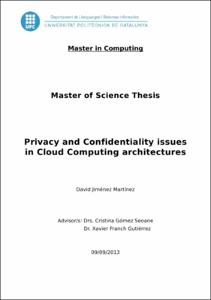Mostra el registre d'ítem simple
Privacy and confidentiality issues in cloud computing architectures
| dc.contributor | Gómez Seoane, Cristina |
| dc.contributor | Franch Gutiérrez, Javier |
| dc.contributor.author | Jiménez Martínez, David |
| dc.contributor.other | Universitat Politècnica de Catalunya. Departament d'Enginyeria de Serveis i Sistemes d'Informació |
| dc.date.accessioned | 2014-02-27T07:57:31Z |
| dc.date.available | 2014-02-27T07:57:31Z |
| dc.date.issued | 2013-09-09 |
| dc.identifier.uri | http://hdl.handle.net/2099.1/20816 |
| dc.description.abstract | Cloud computing is a computing paradigm in which organizations can store their data remotely in the cloud (Internet) and access applications, services and infrastructure on-demand from a shared pool of computing resources. It is clear that cloud technologies have proven a major commercial success over recent years (since the appearance of products and cloud offerings like Amazon EC2 and Microsoft Azure). According to Gardner, Cloud Computing will play a large part in the ICT (Information and Communication Technologies) domain over the next 10 years or more, since it provides cost-savings to enterprises thanks to virtualization technologies, opening gates for new business opportunities as well. However, Cloud Computing has to face several challenges and issues. Storing and processing data out of the boundaries of your company raises security and privacy concerns by itself. Nowadays information is the commodity of XXI century, and certain information can mean power and market advantage. As pointed out by Andreas Weiss, Director of the EuroCloud, in an interview we held with him, data is one of the most important and valuable resource any company has. Therefore, security mechanisms to protect this data are necessary to make the right choices and decisions for the company without worrying about data safety. In the paradigm of Cloud Computing we will have to trust a Cloud Service Provider (CSP), creating an extra dependency to a third party which some customers, depending on the value of their data, will inevitably feel uncomfortable. Outsourcing business data in a place not owned by oneself can scare organizations from using the benefits of Cloud Computing in an optimal way. |
| dc.language.iso | eng |
| dc.publisher | Universitat Politècnica de Catalunya |
| dc.rights | Attribution-NonCommercial-NoDerivs 3.0 Spain |
| dc.rights.uri | http://creativecommons.org/licenses/by-nc-nd/3.0/es/ |
| dc.subject | Àrees temàtiques de la UPC::Informàtica |
| dc.subject.lcsh | Cloud computing |
| dc.title | Privacy and confidentiality issues in cloud computing architectures |
| dc.type | Master thesis |
| dc.subject.lemac | Computació en núvol |
| dc.rights.access | Open Access |
| dc.audience.educationlevel | Màster |
| dc.audience.mediator | Facultat d'Informàtica de Barcelona |
| dc.audience.degree | MÀSTER UNIVERSITARI EN COMPUTACIÓ (Pla 2006) |


